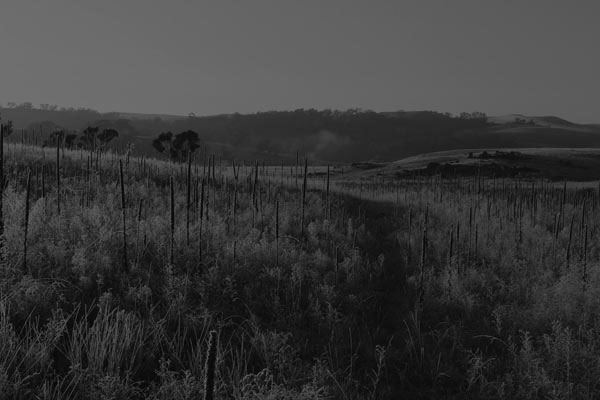Works: written (no message)

No Message is taken from Undefinable Places In-between—a series of short essays I have written, and continue to write, under that title.
No Message
It has been a struggle to write this. Why this place has affected me in the way it has. It was liberating, but not for any reason I could easily identify at the time. And liberating in what way?
On reflection, one obvious and highly explored line of reasoning has been centred around the idea of the indifference of nature — and the realisation of this actuality, the cold beauty of this thought, can affect you deeply.
I stand in this paddock, in the middle of all this beautiful indifference: the grass growing, the long early morning shadows growing shorter, the sun rising, the breeze starting up, and the whole thing feels so enduring. I stand there with a camera around my neck and a head full of volition, thinking about how to get some decent photos, overlayed with what to have for breakfast, overlayed in there somewhere with a dozen wishlists built around the quest for a better life, most of them connected, directly or indirectly to money… or health, or perseverence or luck. Even with all this volition, at best in this place I am incidental. It can do without me.
Perhaps not being needed, to be inconsequential—and realise it—is a form of liberation.
Another way of thinking about this landscape, akin to indifference, is that this is a place that has no messages.
Although it could be argued that even a landscape devoid of text or any standard communications medium has messages; for instance, a wordless statement about competent land management coming from the way a grove of trees has been planted or the way the grass has been mown, but these are messages that have been consciously or unconsciously overlaid. Or it may be argued that a pristine piece of forest has many messages for us —about beauty, about systems working in harmony, about being a natural reservoir of pharmaceutical knowledge, whatever… but these messages are interpretations — imaginings in the minds of humans. The natural world isn’t trying to tell us anything. Trees have no agenda and grass is not out to shift opinions. All of this nature is utterly, unspeakably, beautifully mute.
We need these unspeaking places. Now, more than ever, because of predatory marketing, political spin and outright political lies, the injustices behind relentless corporate lobbying, the pap and crap of Linkedin must-read emails, most motivational speakers, public hospital wings named after supermarket chains…
As necessary as the better end of messaging may be, the noise that overlays the natural world is constantly saying, You should be doing this; you need to be like this; you should be thinking this…
This is the other form of liberation (I think) I have identified: the freedom to feel, be subsumed or taken over, affected, purely by the way things are. The freedom to ‘get it’, to have some understanding of the way it is, using your own senses, intelligence and intuition, rather than submitting to the opinions or agendas of others. This is a ‘gift’ of the natural world that I am cautiously calling truth. Cautiously, because the term has been hijacked (no great secret here) by some of the world’s most skilful and mendacious message-makers.
Here is a heartening thought, however. No matter how much messaging overlays the natural world — even in the most message-overlaid places: the Shibuya crossing in Tokyo, the aisles of a large suburban supermarket, the front benches at Parliament House Canberra, the laptop holding the junk mail in your email inbox—the nature quietly remains. It may have been battered and bruised, reconfigured, covered over and forgotten, but it will not go away, and although it will never have anything to say, it will always have a measureless capacity to inform every cell in your body.
Notes:
Maffra is a small rural district along the banks of the Snowy River in Southern New South Wales, Australia; not far from the towns of Dalgety, Jindabyne and Berridale. Summers are hot. Winters are cold. I’m told the wind blows most of the year and it doesn’t rain much. It’s dry and grassy. It’s in the rainshadow of the mountains nearby.
Photograph, GS.
